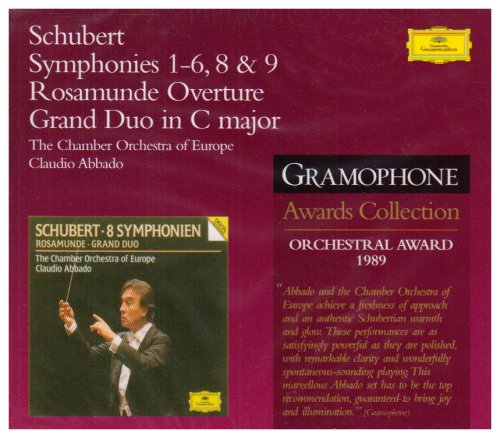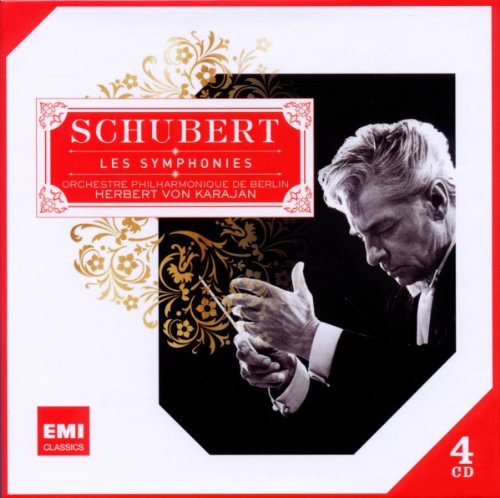Schubert Complete Symphonies
View record and artist detailsRecord and Artist Details
Composer or Director: Franz Schubert
Genre:
Orchestral
Label: Gramophone Awards Collection
Magazine Review Date: 2/1989
Media Format: CD or Download
Media Runtime: 320
Mastering:
Stereo
DDD
Catalogue Number: 423 651-2GH5

Tracks:
| Composition | Artist Credit |
|---|---|
| Symphony No. 1 |
Franz Schubert, Composer
Chamber Orchestra of Europe Claudio Abbado, Conductor Franz Schubert, Composer |
| Symphony No. 2 |
Franz Schubert, Composer
Chamber Orchestra of Europe Claudio Abbado, Conductor Franz Schubert, Composer |
| Symphony No. 3 |
Franz Schubert, Composer
Chamber Orchestra of Europe Claudio Abbado, Conductor Franz Schubert, Composer |
| Symphony No. 4, 'Tragic' |
Franz Schubert, Composer
Chamber Orchestra of Europe Claudio Abbado, Conductor Franz Schubert, Composer |
| Symphony No. 5 |
Franz Schubert, Composer
Chamber Orchestra of Europe Claudio Abbado, Conductor Franz Schubert, Composer |
| Symphony No. 6 |
Franz Schubert, Composer
Chamber Orchestra of Europe Claudio Abbado, Conductor Franz Schubert, Composer |
| Symphony No. 8, 'Unfinished' |
Franz Schubert, Composer
Chamber Orchestra of Europe Claudio Abbado, Conductor Franz Schubert, Composer |
| Symphony No. 9, 'Great' |
Franz Schubert, Composer
Chamber Orchestra of Europe Claudio Abbado, Conductor Franz Schubert, Composer |
| Sonata for Piano Duet, 'Grand Duo' |
Franz Schubert, Composer
Chamber Orchestra of Europe Claudio Abbado, Conductor Franz Schubert, Composer |
| Rosamunde, Fürstin von Zypern, Movement: Die Zauberharfe, D644 Overture |
Franz Schubert, Composer
Chamber Orchestra of Europe Claudio Abbado, Conductor Franz Schubert, Composer |
Composer or Director: Franz Schubert
Label: EMI
Magazine Review Date: 2/1989
Media Format: CD or Download
Media Runtime: 254
Mastering:
ADD
Catalogue Number: 769884-2

Tracks:
| Composition | Artist Credit |
|---|---|
| Symphony No. 1 |
Franz Schubert, Composer
Berlin Philharmonic Orchestra Franz Schubert, Composer Herbert von Karajan, Conductor |
| Symphony No. 2 |
Franz Schubert, Composer
Berlin Philharmonic Orchestra Franz Schubert, Composer Herbert von Karajan, Conductor |
| Symphony No. 3 |
Franz Schubert, Composer
Berlin Philharmonic Orchestra Franz Schubert, Composer Herbert von Karajan, Conductor |
| Symphony No. 4, 'Tragic' |
Franz Schubert, Composer
Berlin Philharmonic Orchestra Franz Schubert, Composer Herbert von Karajan, Conductor |
| Symphony No. 5 |
Franz Schubert, Composer
Berlin Philharmonic Orchestra Franz Schubert, Composer Herbert von Karajan, Conductor |
| Symphony No. 6 |
Franz Schubert, Composer
Berlin Philharmonic Orchestra Franz Schubert, Composer Herbert von Karajan, Conductor |
| Symphony No. 8, 'Unfinished' |
Franz Schubert, Composer
Berlin Philharmonic Orchestra Franz Schubert, Composer Herbert von Karajan, Conductor |
| Symphony No. 9, 'Great' |
Franz Schubert, Composer
Berlin Philharmonic Orchestra Franz Schubert, Composer Herbert von Karajan, Conductor |
Composer or Director: Franz Schubert
Label: DHM
Magazine Review Date: 2/1989
Media Format: CD or Download
Media Runtime: 267
Mastering:
ADD
Catalogue Number: CMS7 69927-2

Tracks:
| Composition | Artist Credit |
|---|---|
| Symphony No. 1 |
Franz Schubert, Composer
Cologne Radio Symphony Orchestra Franz Schubert, Composer Günter Wand, Conductor |
| Symphony No. 2 |
Franz Schubert, Composer
Cologne Radio Symphony Orchestra Franz Schubert, Composer Günter Wand, Conductor |
| Symphony No. 3 |
Franz Schubert, Composer
Cologne Radio Symphony Orchestra Franz Schubert, Composer Günter Wand, Conductor |
| Symphony No. 4, 'Tragic' |
Franz Schubert, Composer
Cologne Radio Symphony Orchestra Franz Schubert, Composer Günter Wand, Conductor |
| Symphony No. 5 |
Franz Schubert, Composer
Cologne Radio Symphony Orchestra Franz Schubert, Composer Günter Wand, Conductor |
| Symphony No. 6 |
Franz Schubert, Composer
Cologne Radio Symphony Orchestra Franz Schubert, Composer Günter Wand, Conductor |
| Symphony No. 8, 'Unfinished' |
Franz Schubert, Composer
Cologne Radio Symphony Orchestra Franz Schubert, Composer Günter Wand, Conductor |
| Symphony No. 9, 'Great' |
Franz Schubert, Composer
Cologne Radio Symphony Orchestra Franz Schubert, Composer Günter Wand, Conductor |
| Rosamunde, Fürstin von Zypern, Movement: No. 1, Entr'acte in B minor after Act 1 |
Franz Schubert, Composer
Cologne Radio Symphony Orchestra Franz Schubert, Composer Günter Wand, Conductor |
| Rosamunde, Fürstin von Zypern, Movement: No. 2, Ballet No. 1 in B minor |
Franz Schubert, Composer
Cologne Radio Symphony Orchestra Franz Schubert, Composer Günter Wand, Conductor |
| Rosamunde, Fürstin von Zypern, Movement: No. 9, Ballet No. 2 in G |
Franz Schubert, Composer
Cologne Radio Symphony Orchestra Franz Schubert, Composer Günter Wand, Conductor |
Author: Edward Greenfield
For all their fine qualities, his previous recordings of the central Viennese classics have never been remarkable for their warmth. With the COE in Schubert it is different. These are performances, recorded in three different venues, mainly in the Konzerthaus in Vienna, but also at Watford Town Hall (Nos. 2, 5 and the Grand Duo) and Valencia (No. 4), which have an authentic Schubertian glow. Anyone worried that a band with the words 'Chamber Orchestra' in the title might sound too puny for the later symphonies, need have no worries at all. The playing here is as satisfyingly powerful as it is polished.
Marriner's versions on Philips, similarly with what is officially a chamber orchestra, remain very impressive, fresh, clean, unmannered readings, and are recorded in more consistent sound, generally fuller and more immediate, but Abbado brings an extra imaginative dimension without losing anything in freshness.
Added to that, he uses specially edited texts for the six symphonies not included in the
So the middle section of the first subject in the Great C major Symphony has a semiquaver figure in the oboe melody quite different from what we have become used to, and four bars which Brahms cut from the Scherzo when he was editing the old
Taking the five rival cycles of the symphonies, the Karajan and Wand (sets newly packaged) as well as Marriner and Bohm (DG), Abbado stands interpretatively closer to Karajan than anyone. It is a merit of both sets that finely detailed, imaginatively pointed readings, coupled with playing of high polish (the COE in places outshining the Berlin Philharmonic) make for fresh, not mannered results. Karajan had never recorded the early symphonies before, and a sense of discovery runs through each work, as it does with Abbado. The last two symphonies too in these EMI versions of the mid-1970s are more spontaneous and less self-conscious than some other versions Karajan has recorded. Where Karajan may disappoint is in the old-fashioned heaviness of his treatment of the Minuets of the earlier symphonies. Abbado and Wand consistently treat them in scherzando style.
The most extreme example is one of the movements most radically affected by re-editing, the third movement of No. 4, the Tragic, where—as has been accepted for some years— Brahms in his old edition had misread Schubert's accent markings as diminuendo signs. Karajan at his very slow speed does give weighty accentuations, but Abbado at his faster speed is much sharper, with many more sforzandos as now revealed. Yet unlike Wand, who adopts an even faster speed and is less crisp with sforzandos, Abbado is relaxed enough to make the Trio into a genuine Landler.
That is an instance where Abbado is freer than Wand—or for that matter Marriner and Bohm—over easing and modifying the basic tempo of a movement, though rarely with anything but spontaneous-sounding results. His moulding of phrases is as detailed as Karajan's, often more so, yet the results are similarly spontaneous-sounding. In principle the lovely slow movement of the Tragic may be too romantic as Abbado presents it, but with yearningly tender oboe playing (a mark of the whole set, from, I assume, Douglas Boyd the regular principal) I find it the most winning account of all.
The only place where I find Abbado's subtle pointing dangerously drawing attention to itself, is in the Unfinished Symphony. There in the first movement, the second subject has Abbado starting each phrase with a slight agogic hesitation, very beautiful and very refined, but not really so effective as the simpler, folk-like treatment favoured by the others. Yet his slowing for the ominous opening of the development section in that movement adds superbly to the tremendous power of the climax as it builds up, a totally justified freedom of expression, the mark of a master interpreter.
In the Great C major, too, the hand of a master, the touches of individuality, the moments of freedom, give Abbado's reading an extra weight lacking, say, in Marriner's. Much is owed to the crispness of the COE ensemble, not least in the enunciation of dotted rhythms or—in the finale—the scurrying triplets, where this is as clean in texture as a performance—like Sir Charles Mackerras's with the Orchestra of the Age of Enlightenment on Virgin Classics—on period instruments. Though in conventional style Abbado allows a momentary easing into the second subject of the first movement of that symphony, and draws out the cello melody after the big climax of the slow movement, his choice of basic speeds makes those modifications seem naturally expressive and not at all self-indulgent.
To sum up, all five sets have strong arguments in their favour. Both the Bohm on DG as well as Karajan on EMI come on only four mid-price CDs, though they omit many exposition repeats. Both are very conveniently laid out in sequence, two symphonies per disc, with Nos. 8 and 9 a generous package. The new Karajan reissue brings warmer, smoother sound than the Bohm, though it is not quite so sharply focused. The set is advertised by EMI as a ''Limited edition''. The Wand is a direct repackaging of the five separate CDs from Deutsche Harmonia Mundi, and brings bluff, fresh performances which in their directness and general preference for fast speeds are very winning, though I still question Wand's unnaturally urgent speed for the slow movement of No. 3. The playing of the Cologne Radio Symphony Orchestra is not quite so polished as that on rival sets, while the recording is not so full and has less bloom than either Marriner's Philips set or the Abbado.
The balance of advantage between Marriner and Abbado is clear enough. On one disc more than Abbado, Marriner with his consistently fresh, direct and polished readings provides a whole range of extra fragments and reconstructions in the fascinating editions of Professor Brian Newbould. Abbado's extra items on five discs instead of six are generous too, not just the Rosamunde Overture (Zauberharfe) but the Joachim arrangement of the Grand Duo, not likely to be confused with an original Schubert symphony but bringing illumination to a work which in the very forces involved, piano duet, gets unjustly neglected. As I said, the Philips sound is rather more consistent than the DG, but with its new look at the texts, with its refined and imaginative performances, sunnily expressive, powerful and intense, the new Abbado set would now be my first recommendation, guaranteed to bring joy and illumination.'
Discover the world's largest classical music catalogue with Presto Music.

Gramophone Digital Club
- Digital Edition
- Digital Archive
- Reviews Database
- Full website access
From £8.75 / month
Subscribe
Gramophone Full Club
- Print Edition
- Digital Edition
- Digital Archive
- Reviews Database
- Full website access
From £11.00 / month
Subscribe
If you are a library, university or other organisation that would be interested in an institutional subscription to Gramophone please click here for further information.





